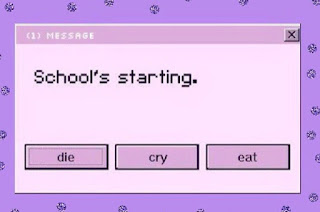"I'm Traumatised"
For those who went through the system, you and I both know the struggle of reading Sukhi daali and Deepdan.
For those who didn't, just be glad.
The thing that irked me the most about that conversation was that they kept referring to the chapters as "traumatic."
And I realised that this wasn't the first time such an incident occurred in front of me.
By introspecting my conversations with people, I realised the term was trivialised, simply because they didn't know what it meant.
Google defines Trauma as an emotional response caused by severe distressing events that are outside the normal range of human experiences.
Take a second to read the underlined words: severe, distressing, outside normal.
Trauma is a strong word. Unfortunately, it has become ubiquitous in our lexicon, applied liberally to describe an ever-widening spectrum of experiences.
When you use this word in the context of a test that's not going to matter 72 hours from now, accidentally bumping into someone on the street who you knew several years ago, or even reading a chapter for school, you're trivialising the word.
"Oh , I have it too."
"Oh I have PTSD from that subject."
If you make such phrases in real life, just for "the kicks of it", or make trauma your "personality", you are contributing to the stigma that stops people who are actually suffering from it, from opening up.
Because they fear that when they use this word, it'll be treated like an everyday thing - it won't be taken seriously. And, while trauma isn't a competition, it can be extremely triggering for someone with a legitimate trauma to hear someone use the term for a challenging situation simply because it has slid into their vernacular.
Experiences do not have to be extreme - neither amazing nor traumatic. They can simply be good, bad, hard, okay, or disappointing. We need to re-learn what it is like to simply sit in our discomfort.
PTSD - Post Traumatic Stress Disorder- is much more than a term to use when reminded of a challenging time: It is when long-term symptoms interfere with a person’s life - flashbacks, hypervigilance, panic attacks, changes in perspectives on life, extreme physiological reactivity, and avoidance of certain stimuli and situations, to name a few.
It's okay to have used this term in the past if you were unaware of its graveness.
But if you choose to consciously continue using it in the wrong context, you are a part of the problem.
This blog has been on my 'to be written' list for over 2 years so I hope you liked it :)
And if you did, be sure to check out this blog too: "Bro, Depression Ho Gaya"
Don't forget to share and follow for more content, every second Friday of the month!
Signing off,
Kuhu :)





I completely understand where this post is coming from. Using mental health terms without understanding their gravity can invalidate the experiences of people who are truly suffering.
ReplyDeleteBut I also think it’s worth exploring another layer to this discussion, especially the role of humor.
Humor, at its core, is a powerful tool for connection. It helps us relate to one another, bond over shared experiences, and even cope with challenges. Sometimes, exaggerating our experiences with phrases like “I have PTSD from that” isn’t about diminishing actual trauma—it’s about using language in a lighthearted way to express the depth of our feelings or create a sense of camaraderie.
For many people, humor helps navigate discomfort, build rapport, and break down emotional walls. It doesn’t necessarily mean they don’t respect or understand the gravity of the actual condition. Instead, it can be their way of making something relatable and digestible.
That said, I definitely feel that there’s a line to be mindful of. If someone tells us that our use of the word feels hurtful or triggering, it’s important to listen. Intent matters, but so does impact. It’s possible to balance using humor in a way that brings people together while being sensitive to those who might see it differently.
I believe that we don’t have to stop joking entirely and just need to be aware of when it’s appropriate and whom we’re around. Respect and humor can coexist, because both are ways we show care for each other. (Also, wonderful post btw, I’m a huge fan!!!)